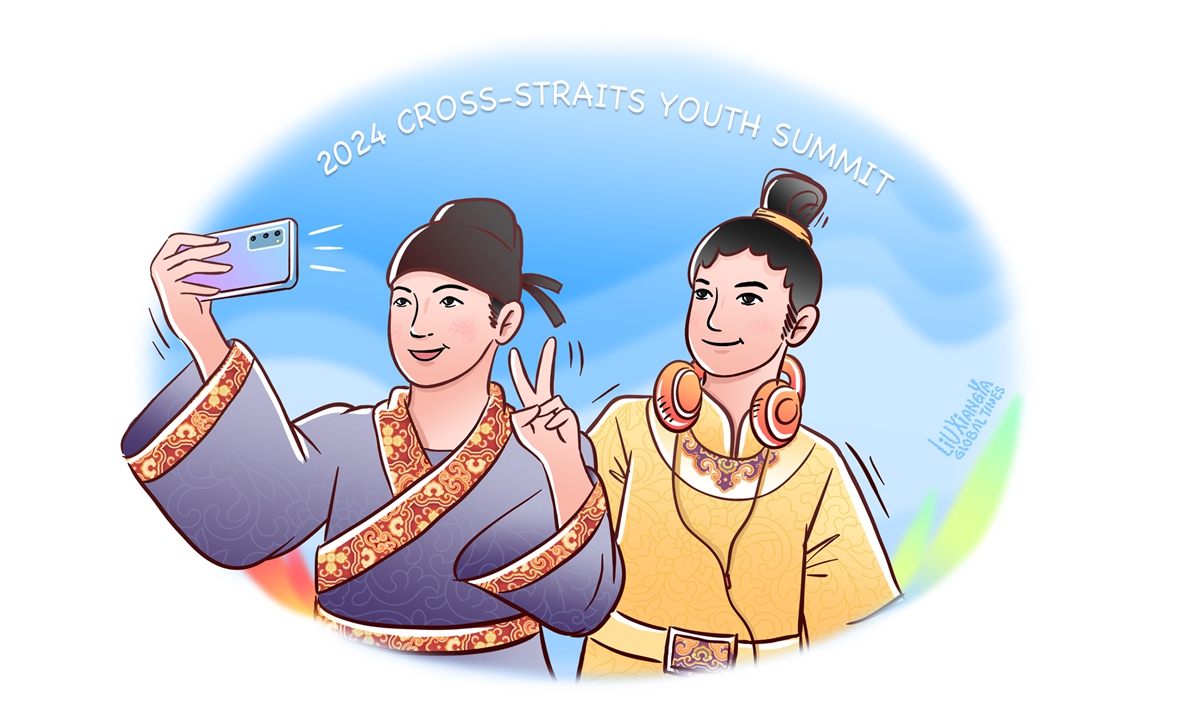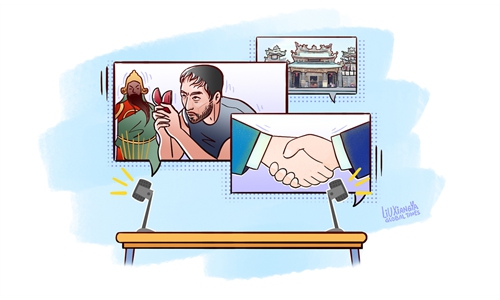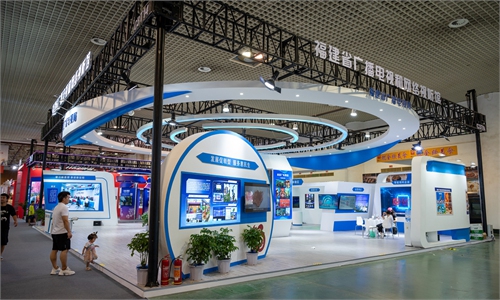ARTS / CULTURE & LEISURE
Like ducks to water: Taiwan youth in mainland

Illustration: Liu Xiangya/GT
Recently, a cross-Straits activity was held in Beijing to promote exchanges and cooperation among young people across the Taiwan Straits. Youth is the country's hope and future. Youth exchanges are a fantastic way to energize and vitalize cross-Straits relations' peaceful and integrated development, whether for short-term visits or long-term settlements.
In 2023, former chairman of the Chinese Kuomintang Ma Ying-jeou led a delegation to the mainland to pay homage to his ancestors. He initiated an exchange between the young people of the island of Taiwan and mainland, promoting friendship between them. Subsequently, at Ma's invitation, teachers and students from five mainland colleges and universities visited Taiwan.
In 2024, Ma again led a delegation of youth to the mainland for visits and exchanges in Guangdong, Shaanxi, and Beijing. Upon meeting again after an extended period, the young people reunited with former friends and acquaintances, smiling and exchanging greetings. Ma also extended another invitation to mainland students to visit Taiwan. Over the past year, young people from both sides of the Taiwan Straits have traveled back and forth. Their friendship has further mellowed and matured, becoming integrated into the bond between the two sides of the Taiwan Straits.
Bill Lin, a Taipei resident who came to the mainland in 2000, started his own technology company in Shenzhen, South China's Guangdong Province because he found that virtual technology and applications were developing rapidly in the city and there was a great demand from European customers. He settled in the city because Shenzhen has a fantastic development environment with its support policies, resources, and services. Having worked in Shenzhen for many years and accumulating rich experience, he is now considering supporting more young people to fulfill more social responsibility.
"I think it's a great option for young Taiwan people to come to the mainland for development because we share the same culture, and it's easier for them to adapt when they come over," said Lin. He has been encouraging university students on the island of Taiwan to make use of their summer and winter holidays to do internships in the mainland.
"I love working and living here. I've taken to it like a duck to water," Liao Chengmao, a teacher from Taiwan at Xi'an Jiaotong University in Northwest China's Shaanxi Province, said, noting that his more than 10 years of study and work in the mainland have given him a sense of accomplishment. In his spare time, Liao enjoys his life in Xi'an. He is fond of exploring shops, tasting food, visiting beautiful scenery and various museums to feel the history and immerse himself in local customs. He is fond of sharing the stories of his work and life in the mainland with family and friends in Taiwan. He hopes that through what he has seen and heard, he can help improve mutual understanding.
The advancement of cross-Straits youth exchanges is of significant importance. Firstly, it facilitates the inheritance and promotion of traditional Chinese culture, enhancing the Chinese nation's sense of identity and belonging. Through common inheritance, historical review, and discussions on future development, young people can collectively appreciate the charm of Chinese culture, thereby strengthening the spiritual bond between them.
Secondly, it enhances social cohesion and centripetal force. The intercollegiate exchange program and joint participation in various forms of exchange, such as academic activities, facilitate the formation of shared values and a sense of common ground between youth on both sides of the Taiwan Straits. This, in turn, contributes to strengthening social cohesion and forming a unified identity. For instance, since 2009, Renmin University and the National Chengchi University have collaborated to organize the "Cross-Straits Forum on Frontier Issues in Finance and Economics." Dedicated to advancing Chinese modernization with tangible outcomes, this forum, held every other year in Beijing and Taipei, has facilitated cross-Straits cultural exchanges and further deepened cooperative research.
Thirdly, it promotes economic cooperation and integrated development. Through youth entrepreneurship forums and economic trade fairs, cross-Straits youth can work together to identify potential avenues for collaboration, enhance mutual trust, and improve cross-Straits economic cooperation and integrated development. Furthermore, it fosters the growth of future leaders and talented communicators with vision and courage who can inject new vitality into the future development of cross-Straits relations.
While pursuing their aspirations and fulfilling their social responsibilities, young people also realize the greater value of participating in cross-Straits integration and development. It is our hope that young people on both sides of the Taiwan Straits will learn from each other, collaborate, and contribute their strength to national rejuvenation.
The author is a faculty member with the School of Applied Economics, Renmin University of China



